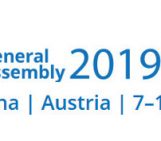
At some point in your career, usually, sooner than later, you will need to write a grant proposal to ensure yourself a paid research position.
Funding agencies are out there waiting to receive your great and original ideas and possibly grant you some money to transform these ideas into actual science. One can spend an entire day just researching on the internet the best funding scheme. To help in this quest, we start here a list of funding schemes for geoscientists at PhD and postdoc level available in Europe, but not limited to European applicants. For each scheme, we provide a short description and a link to where to find more information: just click bold blue words.
This list is based on NhET members knowledge and may not be complete. If you know more and you would like to share your information with the community, please leave a comment on this post. Also if you notice links not working properly, leave us a comment about them, please.
Let’s start. (Alphabetical order)
Alexander von Humboldt Foundation
A German Foundation, whose goal is to connect academic excellence worldwide and the transfer of knowledge. The programs available are various and divide into schemes for academics from abroad or/and from Germany (highlighted with an * in the text). They then differentiate based on the experience of the applicant.
- Postdoctoral researchers, up to 4 years after PhD completion:
- Humboldt research fellowship,
- Georg Forster research fellowship, specific for researchers from developing countries,
- *Feodor Lynen research fellowship.
- Junior research group leaders, up to 6 years after PhD completion:
Applications can be sent at any time of the year and it takes approximately 4 to 7 months to receive feedback.
AXA research fund
Axa offers Future Research Leader Fellowships, a funding scheme aiming at supporting young promising researchers on a priority topic aligned with AXA and the Society. The AXA Research Fund only partners with academic or non-academic institutions located within countries where the AXA Group has insurance operations.
The Branco Weiss Fellowship
Funding up to 10 postdoctoral fellowships per year, with a duration of 5 years in new areas of science, engineering and social sciences. The research project departs from the mainstream of research in one’s particular discipline and it is conducted in any research institution anywhere in the world. The proposal demonstrates a ‘willingness to engage in a dialogue on relevant social, cultural, political or economic issues across the frontiers of your particular discipline’. The applicant should hold a PhD degree for no more than 5 years and be a maximum of 34 years old. Next deadline: 15.01.2019
DAAD
The German Academic Exchange Service. They support students, researchers and artists from and to Germany. They have exchange programs that serve foreigners and Germans or foreigners who have been carrying out their main working activity (for example the PhD) in Germany, want to go abroad and return afterwards in Germany.
- For everyone:
- P.R.I.M.E. temporary job position: 12 months abroad and 6 months (re-)integration in Germany. One call per year.
- For internationals coming to Germany:
- Research grants for Doctoral programs or one-year grants for applicants from graduate students to post-doc level
- Research stays for scientists (1-3 months)
- Special programs (Leibniz, DLR)
- For Germans going to an abroad destination:
- Short-term (1-6 months) postdoctoral research fellowship for pursuing an independent research project at a research institute of your choice.
DFG – Deutsche Forschungsgemeinschaft
The largest independent research funding organization in Germany. They fund individual research projects, research collaborations and infrastructure, coordinate programs. They target researchers of any age, who hold a doctorate degree and would like to work in Germany. They have several schemes for ECSs from the postdoc period to the achievement of tenure eligibility. With some specific program exception, there is no deadline to apply for funding.
- DFG-funded project via contacting the project’s PI.
- Research fellowship for a project abroad (outside Germany) for max 2 years with the possibility of max 6 months reintegration grant.
- Temporary position as PI to pursue an individual research project in Germany. Up to 3 years position.
- Emmy Noether Programme to acquire academic independence and lead own independent junior research group. The applicant has 2 to max 4 years (+2 years per child) postdoc experience and substantial international research experience. Generally 5 years position.
- Heisenberg fellowship for applicants heading to a professorial appointment. Max duration of 5 years and can be combined with a research grant proposal.
European Research Council (ERC)
The ERC offers different type of grants based on the researcher experience. ECSs with 2 to 7 years of experience after the PhD, ready to work independently and showing potential to be a research leader, can apply for an ERC Starting Grant. It consists of up to 1.5 million euro awarded for a period of 5 years. New calls open every year.
ESA – Living Planet Fellowship
An ESA initiative to support young researchers who have a doctoral degree and would like to initiate a scientific career in the context of Earth Observation and Earth system science. Be aware that the fellowship can be granted to people working in institutions located in an eligible ESA Member State, see the website for further information.
Helmholtz Association
This association is Germany’s largest research organisation and produces cutting-edge research focussed on solving major societal challenges. Among the six-fields of interest, there is Earth and Environment. You can apply to:
- Doctoral Training Programmes.
- Helmholtz Young Investigators Groups has a call each year in January and offers internationally outstanding postdoctoral researchers the opportunity to create their own research group. Applicants with 2 to 6 years of postdoctoral experience, research experience abroad and an exceptionally strong research proposal may apply.
- Women Scientists in Managing Positions supports the appointment of excellent women increasing the proportion of women in the upper management levels of the Helmholtz Association.
- Helmholtz Mentoring Program.
Marie Skłodowska-Curie actions (MSCA)
MSCA are EU funding schemes providing grants for researchers at any stage of their career. Their motto: transnational, intersectoral and interdisciplinary mobility. They have different types of scheme: Innovative Training Networks (ITN), Individual Fellowships (IF), Research and Innovation Staff Exchanges (RISE) and more.
If you obtained your doctoral degree and the eligibility criteria apply, you could aim for an Individual Fellowship (IF). This type of grant supports researchers with a doctoral degree that want undertaking mobility between countries within the EU as well as outside the EU, and eventually with the non-academic sector. They also include the possibility for non-EU researchers to come and work in the EU. One call per year, check the website for the next deadline.
Natural Environment Research Council (NERC)
NERC is the UK’s largest funder of independent environmental science, training and innovation, delivered through universities and research centres. The Independent Research Fellowship (IRF) grants five-year awards (80% of the Full Economic Cost (fEC) of a programme of research)to support outstanding environmental scientists of any nationality and enable them to develop their research, start to build a research group and become internationally recognized. The applicant chooses an eligible host organization in the UK, he/she has max. 8 years of full-time postdoctoral experience from the PhD certificate date to the closing date of the fellowship competition (part-time work or career breaks: extension accordingly).
The Leverhulme Trust
The Leverhulme Trust is one of the largest all-subject providers of research funding in the UK. It grants postdoctoral fellowships not bound to any particular subject. They are mainly supporting researchers who are residents of the UK. Early Career Fellowship funding for up to 3 years covering 50% of the fellow’s salary costs (balance to be paid by the host institution). Criteria are application up to 5 years after the PhD, no full-time permanent academic post in a UK university, willingness to change research institution.
The Newton International Fellowship
They support early-stage postdoc researchers from all over the world in physical, natural and social sciences and the humanities for projects with a duration of up to 2 years to be carried out at UK research institutions.
The Royal Society
The RS is the independent scientific academy of the UK and the Commonwealth and offers University Research fellowships that support postdoc researchers (3 to 8 years after the PhD) from the EEA area and Switzerland in life and physical sciences, including engineering. They offer a position for 5 (+ 3) years at a UK – based host institution.
Volkswagen Stiftung
The Freigeist’ Fellowship sponsors one position as head of a junior research group in any discipline linked to an institution in Germany. The position is up to 5 (+3) years. You should have obtained your PhD no longer than 4 years before submission.





Diana Reyes
You did a excellent job! This post sound really nice.
I saw something like a few weeks ago, something similar to another blog on a different topic, but you did in-depth research, and your post seems to be more persuasive
than others. I am amazed by the arguments you provided as well as the manner of your post. I like when articles are both informative and interesting, when even boring facts are presented in an interactive manner.
Well, it is surely about your post.